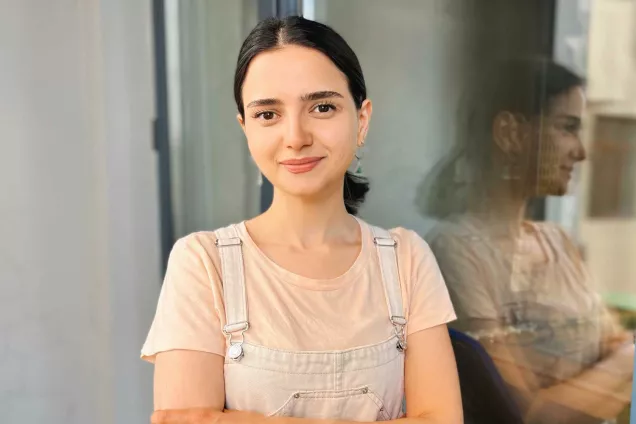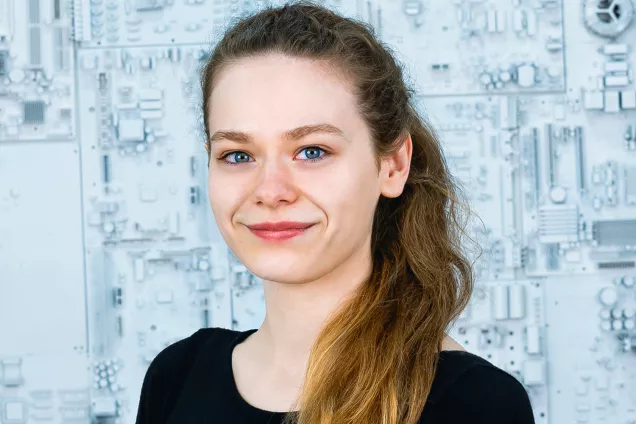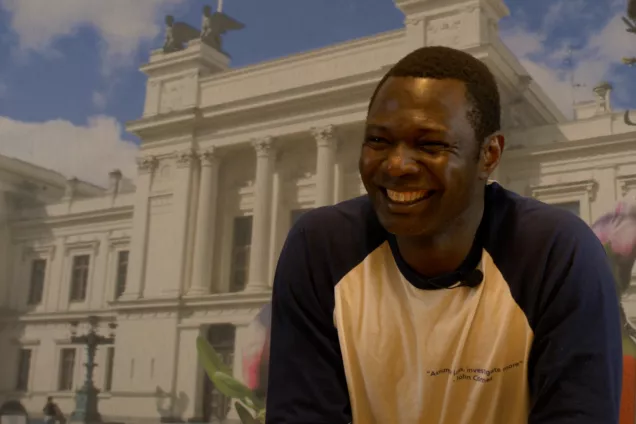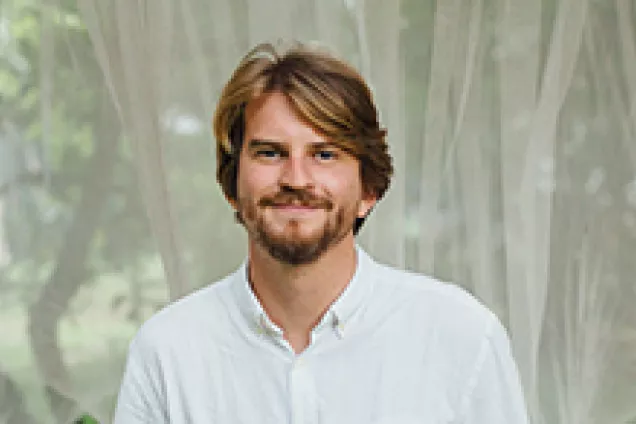What Xuan says about the Master's in Media and Communication
Xuan from Vietnam
You can read Xuan's testimonial below, or watch it on YouTube.
About the programme and the teaching style
What do you think about your programme so far?
"I can say that I'm really happy about my choice because it turned out even better than what I expected. I was thinking of studying as just going to class, sitting there and listening to the professor, but it is so much more than that. I especially enjoy the seminars and workshops after a lecture where we discuss more practical and relevant aspects of real-life matters that relate to our lesson. We also get to have a dialogue with our professor, a sort of two-way communication. We have a lot of opportunities and chances to work and collaborate with our classmates in group work. More generally concerning student life, we can enjoy going to a coffee shop, into the park or having a lot of activities at nations, and all this makes me very happy!"
What is the best thing about your programme?
"At first, I was very surprised about the seminars and workshops, because I had no idea what they were. I didn't have those during my Bachelor’s and didn't know about the format. This is why after a lecture I am now always excited to follow up with a seminar and workshop. I think this is when we truly learn. We just discuss with our professor and then we work on real-life cases and apply the theoretical knowledge that we gain from our class material. We also ask questions to the professor, work together to explain a problem and then share it with our classmates in an easier way to understand. I think that is where the programme gets more practical, easier to understand for everyone and more applicable to real-life situations. That's what I really enjoy."
Why should prospective students choose this programme?
"In the course, we study media audiences and popular culture which would sound interesting to anyone with a passion for communication. We frequently have other forms of activity and events that enable us to get more hands-on experience in real life. We also have a lot of academic resources, as well as help from managers, professionals and professors. I think this programme will be a great choice in the communication field because this upgrades one’s knowledge and experience in the academic field, as well as the applied practical side of communication, for students to further develop themselves."
What is your favourite course so far and why?
"I think my favourite course is the first course that I had in the first semester. It's called Media Audiences and it was led by our programme director. We studied how to understand our audiences from a media and communication perspective, so the students get to learn how we have approached the concept from the very beginning of communication and media. We go through the history and the relationship between the state and media audiences. We also ask what is the best way to approach and understand them and how to utilize that knowledge in our daily lives and work. The seminars and workshops with the professor, mentor and classmates were also really fun!"
Have you been able to gain any practical experience during your studies so far?
"I haven't enrolled in any internship or part-time job yet, but last month my department had a symposium between the first and second-year students to give us a chance to meet up. The second-year students shared their Master’s theses so that first-year students can learn from them and give comments on the topics. We learned a lot about what is expected of us for the second year and also meet some alumni and the whole department. I also joined student associations here in Lund more on a volunteer basis. Next semester I might go on an internship. Overall, there are a lot of opportunities for students in this department to get either more knowledge in the field or more connections for our practical experience."
What do you think of the teaching style?
"It's definitely very different from what I had 10 years ago in Vietnam. The culture is different here. Students have more freedom in terms of how to have the best study experience for themselves and also when they study in groups. I think what I enjoy most is the relationship with the professors. We feel comfortable and, in a way, it feels easy to have a conversation with them anytime. You can just email them or, if you see them in the classroom, you just go and ask them. I also love that you can just call the professor by their first name, which makes the students closer to them and makes the relationship friendlier. We still have lectures, but we also rely a lot on our own studies. I don't have that many lectures, maybe two lectures per week and a seminar and workshop. We work with our classmates but the rest of the time we are given time to digest our course material. Since it is a Master’s, a lot rests on self-discipline and self-study."
If you want to know more about Xuan's thoughts on self-study and study location tips, you can also read her blog post.
Xuan's blog post: 'How and Where I Self-Study at Lund'
How “international” is your programme?
"I think this year we have around 25 students and at least 20 nationalities. We are very international and have a good mix of students from Asia, Europe, North America, South America and Africa."
Thoughts on being an international student at Lund, spare time, Sweden and tips for prospective students
What it is to be an international student at Lund University?
"I think the thing that I enjoy most as an international student here is that I don't feel alone because there are a lot of other international students everywhere. Lund University is a really big university and the city also offers a lot of activities in a very friendly way to foreigners. Honestly, I feel I'm very lucky to have such a good student life here. The only thing that I struggle a little bit with is, since I come from Southeast Asia, the climate here is really cold for me. But the Swedish people have a popular saying: “There's no bad weather, only bad clothes”. This was something I had to get used to. Other than that, I think that as an international student here, prospective students will not have a problem getting to know a new place, meeting new classmates and friends and enjoying life in northern Europe!"
What do you do in your spare time?
"I frequently find updates on either the university website or student associations’ pages on social media to get their latest events. I really like that my schedule is never the same from day to day. I will also hang out with my friends from my class or from my home country at student associations and nations. Lund has a lot of activities, lunches, dinners and potlucks. I also save time to exercise a bit. I like going for a walk because the nature here is really nice. I also go to a gym sometimes or travel around the Skåne region."
Do you have any advice for other students that are considering coming to Lund?
"The first thing that I want to tell prospective students coming here is: don't worry so much about the weather! To be honest, I know that it's something that people highlight about Sweden, but here in the south of Sweden, I think it's much more manageable – even for someone from a tropical country like mine. If I can survive, you guys can survive too!
The second thing is I think life in Lund or Malmö or anywhere in Sweden depends a lot on how open and ready you are to adapt to changes, to go out there and be with other people. Moving to another country is absolutely scary. In my case, I'm over 30 and going back to school was scary for me. But I have to admit that it will teach you a lot. Living on your own, finding your apartment, and getting to know new people in your class and outside can be scary, but it's a really good journey. I would say just go, be who you are, be open and try to adapt to it with a positive mindset. There will be bumps on the way, but you will have friends with you, as well as a mentor. The people around here are very nice. You will learn a lot and you enjoy it."
What surprised you the most about Sweden?
"Before I came to Sweden, I was already working for a Swedish company for five years, so I knew a little bit about Swedish people and Sweden. But even with that, when I came here there are certain things that I found very typical of Swedish culture, especially recycling and sustainability. They're really serious about it, in a good way. I learned how to separate my waste and recycle it in a way that will contribute to protecting the environment. I also find Swedish people very calm and collected. I feel it has a good impact on my mental health. It helps me to calm myself down a lot and truly enjoy life here. Also, Sweden is a country with a good environment and good air quality, which is really good for your health as well. Swedes are private in some way, but once you get to know them and truly become their friend, they're very friendly and very supportive."
Future plans and career preparation
What are you planning to do after your studies?
"I do have a lot of plans in mind, and what surprised me is that they have changed quite a lot since coming here! Before moving to Sweden, I was thinking of spending a few years here working and then maybe going back home. But now that I'm here, I really enjoy life in Sweden and really want to stay here for a longer time, working and getting to know the culture more. Currently, my main goal would be to graduate first, and then have a think after that. I will try to get a job here and experience the professional working environment here for a few years and then we will see. There are a few classmates of mine who are planning to do a PhD in Communication, and that's also an option for my department. There are a few people here working part-time now and they also plan to graduate and then pursue either a career or a PhD. So there are a lot of options for us after graduation."
To what extent does your degree programme prepare you for a career in your field?
"I can say that the programme is providing me with the necessary knowledge and skills to upgrade my profile. It will help me have a stronger foundation here in the Swedish market. Currently, the studies are quite theoretical. I will finish this spring semester with three more courses and then it focuses on the methodology and skillset specific to the media and communication sector."

Meet our student ambassador Diana
Read her testimonial and chat with her via Unibuddy.

"It can really make you think in ways you never expected"
Barbora from Slovakia

"This has opened my eyes and expanded my horizon"
Danicius from Liberia

"Many opportunities to connect internationally"
Agnė from Lithuania

"I wouldn’t have changed a thing if I could"
Kevin from Germany

"Excellent context from which to build your future network"
Tim from New Zealand